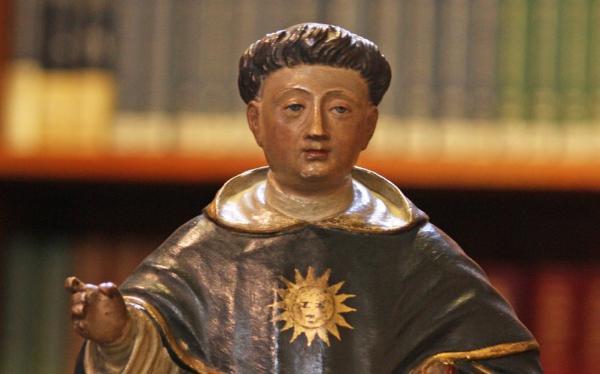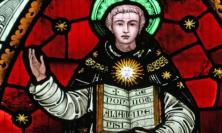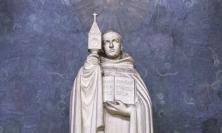As we celebrate the Feast of St Thomas Aquinas on 28 January, Joe Egerton argues that by reflecting on what we understand by Aquinas being a saint, we may better appreciate how much he has to offer us in solving today’s problems.
The preface to The Oxford Companion to Philosophy (published in 1996) places St Thomas Aquinas in the pantheon of great philosophers, alongside Plato and Hume. The long article ‘Aquinas, St Thomas (1224/5-74)’ concludeswith the words: ‘the title doctor communis, by which he used to be known, applies now as never before.’ Its opening is: ‘The greatest of the mediaeval philosopher-theologians. After centuries of neglect by thinkers outside the Catholic Church, his writings are increasingly studied by members of the wider philosophical community and his insights put to work in present-day philosophical debates in the fields of philosophical logic, metaphysics, philosophy of mind, moral philosophy and the philosophy of religion.’ Thomism is given a second, separate entry.
This presents us with a challenge on 28 January each year, when the Church celebrates St Thomas Aquinas. The modern world separates a philosopher’s work from his or her life[1]; how are we to explain why it matters that the author of the Summa Theologiae is a canonised saint?
On being a saint
Some have suggested that we should play down the Christian and Catholic dimension of Thomist thinking[2], divorcing the philosophy from the philosopher. Alasdair Macintyre – who, unusually among modern philosophers, does regard the link between life and writings as important – has observed that being a saint is a disqualification for being treated as a serious philosopher. He made this point about Edith Stein, canonised as Saint Teresia Benedicta of the Cross.[3] Such an observation might tempt us to play down the feast day, to pretend that there is nothing much in being a saint. But that would be to deny the importance in our faith of the concept of being a saint.
Karl Rahner set out why it matters that Aquinas is Saint Thomas in a short essay,‘Thomas Aquinas: Friar, Theologian, and Mystic’. He wrote
To reflect upon Thomas Aquinas ... does not mean merely to think back on some man in history or on his influence in Western thought. Because we are Christians, we are linked to him; we can actually see him as a fellow Christian in the community of saints. Those Christians who have gone before us into the assembly of saints are not dead; they live. They live in perfection, that is, in the true reality which is also powerful and present among us today.... In many ways they are even more real than we are, for they are with God....To look at a saint, then, is not to look at something abstract or impersonal, something dead, but rather to see a concrete person, a unique individual, once alive on earth and now eternally alive, someone who loves and praises, someone who is blessed and redeemed.[4]
A singular sense of direction
To talk of Thomas the philosopher without any regard for his life would impoverish us. His was a life directed towards God. Born in 1224 or 1225 into one of the most powerful and wealthy families in Italy, cousins of the Holy Roman Emperor, the young Thomas Aquinas was intended for a career in the Church, almost certainly as Abbot of Monte Casino. His family thought this would be a position like that which was later described by Gibbon: ‘I have somewhere heard or read the frank confession of a Benedictine abbot: “My vow of poverty has given me an hundred thousand crowns a year; my vow of obedience has raised me to the rank of a sovereign prince” – I forget the consequences of his vow of chastity.’[5]
Thomas had different ideas. He wanted to become a Dominican. This horrified his family. He was kidnapped by his family and his mother locked him up in the family castle. His brothers sent a girl to seduce him; he drove her from his room and burned a cross on the door. Eventually his family accepted his vocation and he became and remained a Dominican until his death, refusing later to become Archbishop of Naples.
Only a person with a great sense of purpose and commitment could have achieved what Thomas Aquinas achieved. We do him wrong and we mislead others and ourselves by pretending that character can be divorced from achievement.
Divine providence or coincidence?
Even in his own day, Thomas Aquinas was regarded as a marginal and eccentric thinker. Although his greatest work, the Summa Theologiae, was preserved and studied by members of the Dominican order, it did not form a central part of the curriculum of any university until the sixteenth century. His Commentary on the Sentences of Peter of Lombardy was until then the standard work used in the University of Paris.
The early sixteenth century saw a revival of interest in the Summa and the works of St Thomas. Papal support played a major part, leading to the Summa being placed on the altar at the Council of Trent alongside the gospels.[6]
By what some would regard as mere chance and others divine providence, the Dominicans in the Collège Sainte-Barbe in Paris had adopted the Summa as a main text some years before Ignatius Loyola arrived in Paris to study philosophy.[7] This was to have the most important consequences. St Thomas and the Summa were prescribed in the Exercises and Constitutions.[8] The fact that younger Jesuits were rebuked for poking fun at St Thomas is evidence that the writings of St Thomas were used extensively by the fast growing Society of Jesus.
In the eighteenth century, the Catholic Church largely withdrew from philosophical enquiry – a story intertwined with the Suppression of the Society of Jesus. In the 1840s a Jesuit in the restored society was to astonish Newman by telling him that there was no philosophy studied in Rome – ‘Aristotle is in no favour here – no, not in Rome – nor St Thomas.’[9] But by then a small number of Jesuits recognised in St Thomas the resource needed to tackle the challenge of rationalism. Among their number was the philosopher, Josef Kleutgen who was to play a major part in drafting an encyclical that the philosopher-Pope Leo XIII (himself educated in Thomism by the Jesuits) was to issue on the revival of Catholic philosophy: Aeterni Patris. This urged Catholics to develop philosophy ‘ad mentem Divi Thomae’ – ‘according to the mind of the Divine Thomas’.[10]
What followed was an awful warning of the dangers of blind reliance on authority. I outlined what went wrong in ‘Faith, Reason and the Modernists’. Tragically, the misrepresentation of St Thomas Aquinas as an authority whose views were not to be challenged – something one occasionally finds repeated even today – rather than as a model of how to go about challenging and testing received wisdom, preserving what is true and useful and rejecting what is false and harmful, led, as the Oxford Companion observed, to his being disregarded as a serious philosopher.
Since Vatican II we have seen a remarkable resurgence of interest in St Thomas’s writings. Some of the fruits of Aeterni Patriswere bitter, but others have proved remarkably sweet. Leo XIII’s great project of recovering and publishing the texts of St Thomas has led to reliable versions becoming easily available. John Paul II, another philosopher-Pope, re-defined the project of Catholic philosophy in Fides et Ratio, which both contains a re-statement of the fundamental importance of St Thomas’s emphasis on the purpose of both theology and philosophy to help us to reach our true end in eternal life with God, and provided what Aeterni Patris lacked: an explicit encouragement of philosophical study in general.
St Thomas and the modern world
The feast of St Thomas also provides an opportunity for a reflection on the distinctive vision for society that is held by the Church and Christian communities.
The Summa Theologiae develops a series of arguments about the relationship between God and the world that He created that provide for the operation of human reason and free choice. The Summa provides compelling reasons to reject a fundamentalist approach to law and the state, but it also provides an account of human law that subjects it to what we would describe as moral criteria. For instance, a law that commands an action that is prohibited in the divine law is not to be obeyed.
Rather than seek to do the impossible in summarising these rich and complex arguments in a short article, I offer three contemporary examples of how St Thomas speaks directly to us in 2012.
The emerging debate on ‘moral capitalism’
The financial crisis has revealed the weakness of unthinking reliance on ‘the market’. ‘Moral capitalism’ is shorthand that both David Cameron and Ed Miliband have adopted for their rival visions of a new political economy The differences between their versions of what moral capitalism is should not obscure the common rejection of ‘the market’ as an automatic mechanism that avoids the need for humans to make moral judgments. Moral capitalism in whatever form it takes rejects those schools of economic and organisational thinking that assert that there is no moral content to economics and management, and that the only criteria by which we should judge success is the money that is generated.
It requires a different view of justice from that of Hobbes, who defined justice as obedience to law. It rejects Weber’s claim that there is no room for a concept of morality in business; on his account, management is about the efficient delivery of goals that are set externally and morality does not come into it. These have proved to be very convenient doctrines for those running banks and big businesses. But the proposition that there are no moral questions to be asked of something that is not unlawful and allows money to be made is one that moral capitalism in all its forms has to reject. Moral capitalism also requires us to address a difficult legacy that Adam Smith has left us: his sharp contrast between self-interested market behaviour on the one hand and altruistic, benevolent behaviour on the other obscures from view activities in which the objectives to be achieved are neither mine-rather-than-others nor others-rather than-mine but instead are genuinely common goods.
The development of the content of moral capitalism, the making of a choice between the competing visions of Mr Cameron and Mr Miliband, and making it work in the world all require a vocabulary in which ‘good’ means more than ‘efficient’.[11] Where are we to look for this different approach? One answer is the Summa Theologiae. In fact, our political leaders are already being influenced by the ideas of St Thomas, if only at second hand. The idea of ‘moral capitalism’ has been promoted by a number of policy advisers, including some who have acknowledged an intellectual debt to St Thomas.[12]
The Summa offers a comprehensive account of the cardinal virtue of justice[13], an account in which justice is primary and both property and strict legality are secondary. It offers an account of how the impulse to respond to urgent need – an impulse often based on a feeling of pity – can be informed by rational judgment and thus become a fully fledged virtue, to which the Summa gives the name misericordia. It is misericordia that the Good Samaritan displayed when he went to the aid of the Jew who had been mugged.[14] No later philosopher has offered so extensive a theoretical account of this virtue which is often recognised in practice.
Unjust war
Another area of contemporary debate where St Thomas’s writings are directly relevant is the use of force by the state. The forthcoming Chilcot report on Iraq, the conflict in Syria, Iran’s nuclear programme and the continuing disputes over the Gaza strip all point to the need for a coherent and compelling approach that limits the use of force. The use of force to prevent a massacre in Benghazi, like the earlier effective use of force in Sierra Leone to defeat a militia that was maiming children, show that there are occasions when disciplined and skilled military forces have prevented a great evil. Although St Augustine addressed this issue, the questions posed and answers given by St Thomas remain after seven centuries the foundation of every subsequent attempt to determine when and how it is permissible to use force.[15]
Satire
In the fiftieth anniversary year of Private Eye, we might highlight one more topic discussed in the Summa. Unlike the contemporary monarchs Frederick II and Louis IX who would have sentenced Mr Hislop to an unpleasant fate, St Thomas vigorously defended satirists (‘joculares’). This was despite his having been the victim of vigorous satire himself following a dispute over the methods of teaching in the University of Paris. Entertainment and relaxation were, he argued, important parts of a balanced life.[16]
‘Should Auld Aquinas be forgot...’
St Thomas might well have approved, then, of a story that went round as the Great Council drew to a close in 1965: that, on New Year’s Eve, ‘traditionalist’ Catholics would sing ‘Should Auld Aquinas be forgot and ever pass from mind...’
He has not been forgotten.
Joe Egerton is Director of Justice in Financial Services.
[1] This was not the case in the ancient world – contrast Diogenes Laertius’ holistic approach with that of Bertrand Russell, where the biography is treated as one thing and the philosophy as another.
[2] Anthony Lisska Aquinas’s Theory of Natural Law: An Analytical Reconstruction, p. 251 is an example.
[3] Alasdair MacIntyre, Edith Stein: A philosophical prologue,p. viii: ‘Where contemporary American and European academic philosophers are concerned, Edith Stein suffers from another marked disadvantage. She has been canonised. And among the prejudices of most such philosophers is a belief not only that what makes a philosopher a good philosopher one thing and what makes someone a saint in the judgment of the Catholic church quite another – which is true – but that saintliness, unless you have been dead for a very, very long time, precludes philosophical merit. It would have been difficult enough to convince such philosophers to take an interest in Edith Stein. But to convince them to take an interest in St Teresia Benedicta a Cruce, Discalced Carmelite, will be a good deal more difficult.’ She is not the only example. Sir Robert Filmer, author of Patriarchia (1680), is afforded a full entry in the Oxford Companion as a political philosopher who stimulated Locke. Filmer is described as writing ‘against the Jesuits’ when his text names Robert Parsons as his target. If Patriarchia and its author deserve notice so do the Conference on the Succession (1594) and Robert Parsons.
[4] Karl Rahner, ‘Thomas Aquinas: Friar, Theologian, and Mystic’, Cross and Crown 20 (1968): 5-9.
Originally published in the Korrespondazblatt (LXXXVI, 89-93) of the International College Canisianum, Innsbruck, Austria, also in Everyday Faith (1968). Translated by Thomas Franklin O'Meara OP.
http://www.domcentral.org/preach/tasermons/4sermons3.htm
[5] Edward Gibbon, The History of the Decline and Fall of the Roman Empire, Chapter 37
[6] Aeterni Patris para 22
[7] John W O’Malley’s The First Jesuits suggests that Ignatius was particularly drawn to the Dominicans (p. 249)
[8] EXX 363 – the eleventh rule for thinking, judging and feeling with the Church, and Const #464
[9] Quoted in Alasdair MacIntyre, God, Philosophy, Universities, p. 139
[10] For an account of the role of Jesuits in Aeterni Patris see Alasdair MacIntyre’s Giffford Lectures, published as Three Versions of Moral Inquiry, pp. 72-73. Aeterni Patrisis one of the three seminal documents that are analysed, the others being the Ninth Edition of the Encyclopaedia Britannica and Nietzsche’s Zur Genealogie der Moral.
[11] For a detailed development of the contrast between varieties of goodness, and their application to the concept of justice, see Alasdair MacIntyre, Whose Justice? Which Rationality?
[12] Both Philip Blond, the guru of Red Toryism, and Maurice (Lord) Glasman, the guru of Blue Labour are closely associated with the development of the idea of ‘moral capitalism’ and both have acknowledged the importance of St Thomas to their thinking.
[13] The account of justice starts at ST IIaIIae Q58. There is an informative discussion not just of St Thomas’s views but also of those of Plato, Aristotle and Hume in Alasdair MacIntyre’s Whose Justice? Which Rationality?
[14] There is an excellent discussion of this topic in Alasdair MacIntyre, Dependent Rational Animals – Why humans need the virtues(Open Court, 1999),Chapter 10. Dependent Rational Animals draws extensively on Aquinas and is a re-statement of St Thomas’s moral and political thinking. Misericordia is discussed at ST IIaIIae Q30 but as Macintyre observes one also needs to consider St Thomas’s views on beneficence, liberality and justice
[15] The discussion of the conditions for a war to be just is not part of the discussion of the cardinal virtue of justice in the Summa but of the theological virtue of charity. Justice is often regarded as a virtue that governs one’s conduct to other members of one’s own community – one of the great original ideas of St Thomas is that Jesus Christ made us all brothers and sisters, Jew and Gentile alike and thus extended the commandments of the law to the whole human race. The discussion of war is at ST IIaIIae Q40
[16] ST IIaIIae Q168 Art4 - on the sin consisting in lack of mirth. For a detailed discussion, see MacIntyre’s essay ‘Natural law as subversive: the case of Aquinas’first published in the Journal for Mediaeval and Early Modern Studies 1995, Vol 26, No 1 and reprinted as chapter 3 of Ethics and Politics, Selected Essays, Volume 2.






